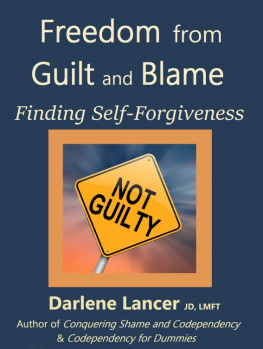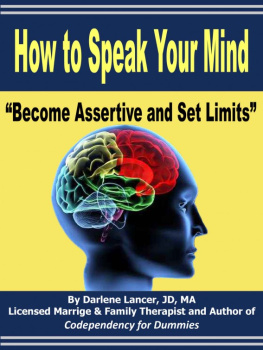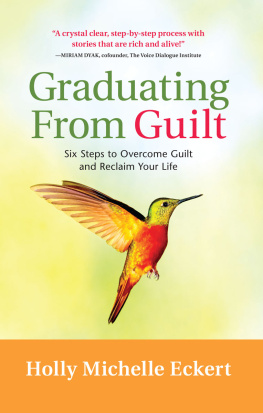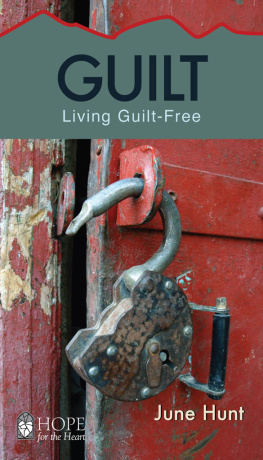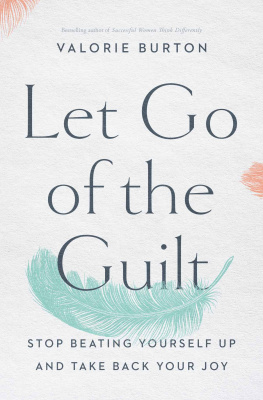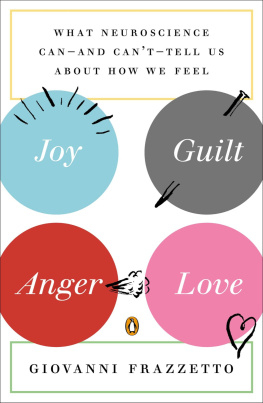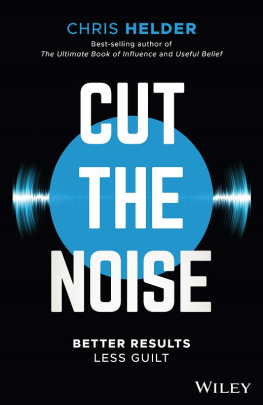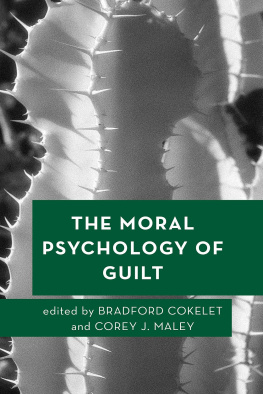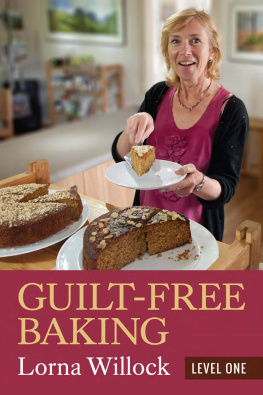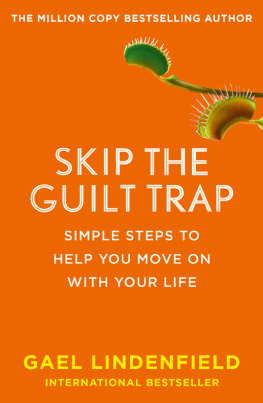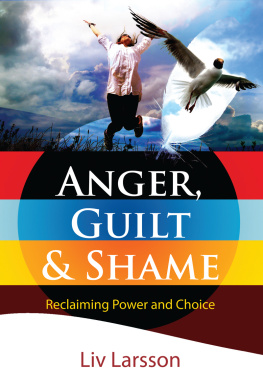Freedom from Guilt andBlame
Finding Self-Forgiveness
By
Darlene Lancer, LMFT
Author of:
Conquering Shame and Codependency: 8 Steps toFreeing the True You
10 Steps to Self-Esteem: The Ultimate Guideto Stop Self-Criticism
Codependency for Dummies
Freedom from Guilt andBlame
Finding Self-Forgiveness
Darlene Lancer
2015 Darlene Lancer, JD, LMFT
Smashwords Edition
All rights reserved. No part of thispublication may be reproduced, stored in a retrieval system ortransmitted by any meanselectronic, mechanical, photographic(photocopying), recording, or otherwisewithout prior permission inwriting from the author.
The information in this book is intended tobe educational and not for diagnosis, prescription, or treatment ofany mental health disorder. Without a personal, individual,professional consultation with you, the author is unable to giveyou professional psychological advice. Hence, you understand thatthe material contained herein is general in nature, and the authordisclaims any personal liability, directly or indirectly forsuggestions and information in this book.
Printed in the United States of America
Learn more at www.whatiscodependency.com
Table of Contents
Introduction
Most of us experience guilt from time totime. As uncomfortable as it is, guilt is good. Yes! Guilt, whenits healthy, actually encourages us to get along with others,improve ourselves, and build self-esteem. Self-forgivenessfollowing guilt is self-essential to self-worth, which is key tothe enjoyment of life and relationships. Yet, for many of us,self-acceptance remains elusive because of unhealthy guilt -sometimes for decades or a lifetime.
Guilt can be an unrelenting source of pain.It keeps us stuck in the past and prevents us from moving forward.We might hold a belief that we should feel guilty andcondemn ourselvesnot once, but over and over. Or, guilt may simmerin our unconscious. Either way, this kind of guilt is insidious andself-destructive and can sabotage our goals and relationships. Itlowers our self-esteem and makes us easy targets for blame and manipulation . Unresolved guiltcan cause anger and resentment, not only at ourselves, but alsotoward others in order to justify our actions. For example, a passive-aggressive person feels too guilty to be directand say no. Resentment builds up that is expressed throughbehavior. Anger, resentment, and guilt sap our energy, causedepression and illness, and stop us from having success, pleasure,and fulfilling relationships.
We cannot truly love or be present toourselves, to God, or to those we love when we feel guilty. Even ifwhat we did was wrong, we can still find self-forgiveness. Thisbook is designed to free you from guilts grip. It will help yousort out whether your guilt is healthy or unhealthy and todistinguish guilt from other emotions, such as shame and regret.This is important because the correct approach to healing differs.Codependents and perfectionists frequently suffer from guilt. Thelinks between codependency and perfectionism and guilt areexplained. Youre guided to identify the source of your values andstandards underlying self-judgment. Three methods for relievingguilt are set forth in detail: cognitive, self-compassion, andspiritual; and specific self-healing techniques and exercises areprovided.
What Guilt Is andIs Not
There are different types of guilt.Additionally, guilt is often confused with shame or regret.Understanding these differences is relevant to how we approachovercoming guilt.
What is Guilt?
Guilt is an emotioncaused by a negative self-evaluation or by the judgment of others.It arises when we havent measured up to our values or normspertaining to what is right or acceptable. The standards may be ourown or those weve adopted from our religion, family, or ourculture. Guilt is usually associated with moral values, such ashonesty, fidelity, or generosity. Therefore, its sometimesreferred to as a moral emotion.
Guilt concerns things that we think, do, orsay (hereafter sometimes referred to collectively as actions orbehavior). We can also feel guilty for needs and feelings, likeanger, lust, or greed; or lack of feelings, such as notreciprocating love or friendship, or for the lack of grief over theloss of someone close. Although irrational, we might feel guiltyfor the thoughts, feelings, and actions of someone else. Its notunusual for us to feel guilty for leaving our faith or not meetingthe expectations of our parents. Some examples of guilt mightbe:
I feel guilty for cheating on an exam.
I feel guilty for wishing my father woulddie.
I feel guilty for drinking too much andkissing
someone other than my girlfriend.
I feel guilty for masturbating.
I feel guilty for bad-mouthing myhusband
to my girlfriend.
I feel guilty for hoping my friendfails.
I feel guilty for being angry at God.
I feel guilty for thinking about sex withmy
wifes sister.
I feel guilty for eating a pint of icecream.
I feel guilty for not helping a friend.
I feel guilty for not contributing to theoffice
fund for a coworkers wedding gift.
The list goes on and on. Generally, guilt isassociated with wrongdoings (including omissions and words). Inreality, from the above examples, its clear that we can feel justas guilty about our thoughts or feelings, often because we believethem to be immoral or sinful. Frequently, we go from feeling guiltyabout something we did, said, or thought to feeling bad aboutourselves as individuals. The thought is no longer, I cantbelieve I did that, but, Whats wrong with me? I cantbelieve I did that. When the judgment is about ourselves,then its actually a feeling of shame, but most of us dontdifferentiate between guilt and shame. More about that later.
Guilt thats not contaminated by shamegenerally consists of two emotions: anger and fear. The anger is atourselves and puts us in a state of inner conflict. The fear is ofpunishmentreal or imaginedby an institution, governmentalauthority, or person. It may only be felt as a vague yet intensefeeling of anxiety or agitation. We can feel guilty for not meetingour standards when no one else would know. Then were thewrongdoer, judge, and executioner. Perhaps its a standard or rule,which would have been punished by a parent long ago; for example,for complaining or losing our temper, but the voice of that parentcontinues to scold us. Other times, its the conscious dread ofbeing fined or jailed, reprimanded, publicly or professionallyshamed, or rejected by someone we care about. This fear of futurepunishment can cause painful anxiety until we find relief.
Existential guilt
The existentialists prescription foravoiding anxiety and guilt was to live an authentic life accordingto self-defined values, rather than a life of accommodation andconformity. This is also the path of recovery fromcodependency.
Twentieth century philosopher MartinHeidegger referred to existential guilt as the anxiety we feel fromliving inauthentically, or when we fail to achieve our potential.An authentic life can mean being deeply connected to ourselves andliving congruently with our naturewho we are as a person. In thisregard, philosopher Paul Tillich refers to existential guilt as anestrangement from God. Unlike Tillich, Heidegger believed that wecan never fully escape existential guilt, because we will alwaysfail to fully actualize all of our dreams and possibilities. Thus,although we cant extinguish existential guilt, we can diminish itby living a life that more closely resembles our dreams.
Feeling guilty vs. being guilty
Although guilt is a feeling, being guilty isconclusion of fact regarding culpability. Legal guilt is a furtherdistinction. We may be guilty legally, but not morally; forexample, if we get a speeding ticket. Someone may be guilty ofbreaking the law or infidelity, but feel no guilt. There are thosewho have no guilty conscience, such as sociopaths, who dont feelguilty even when they egregiously injure someone. The reverse isalso true. We may feel guilt about actions that are neitherillegal, nor immoral or unethical.
Next page
